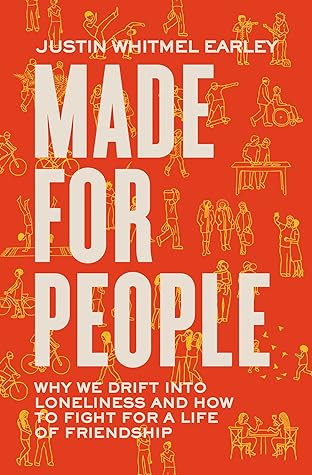More on this book
Community
Kindle Notes & Highlights
Read between
February 1 - February 7, 2025
It is crucial to see that our capacity to be lonely with God is not a sign of God’s insufficiency or lack. It is a sign of his unfathomable generosity: God designed us to need people. You cannot experience God the way you were made to until you experience him alongside others.
The route of the enemy is always to pull you aside and tell you lies about who you are and who God is. Because you are most vulnerable when you are alone.
Adam and Eve are sent out of the garden of God. Cain is sent away from his fellow man. Put together, the stories of Adam and Eve and their son Cain are as short as they are tragic. But they are also incredibly illuminating for our modern predicament. We were made for people, but we are cursed to restless wandering. And a key feature of this curse in both stories is that isolation is both the cause and the consequence of our sin.
In Eden, we were made for each other, to be fully known and fully loved. But in the fall, this is what we lost. We are not known, we fear we are not loved, and we run away and hide. Loneliness breeds loneliness, and we are cursed to lives of restless wandering.
The friendship of Jesus means that one way to summarize the gospel is this: Jesus knows you fully and loves you anyway.
This means that to become more like Jesus necessarily means to become more and more like a friend. You cannot have a real life of faith without friendship.
We mistakenly think that hiding keeps us safe by shielding us from danger. But what hiding actually shields us from is love. It may be counterintuitive at first, but consider that we are not happiest when we are hiding and “safe.” We are happiest when we are exposed and loved anyway. We are the most human when we are most intimately known. And that means coming out of our hiding places.
The great deceiver has whispered in our ears, telling us that our sins prevent us from relationship, so we should be ashamed and hide them. Do not believe it.
Many Christians are unthinkably horrified when a real sinner is suddenly discovered among the righteous. So we remain alone with our sin, living in lies and hypocrisy. The fact is that we are sinners!”5 So then, let’s talk like we’re sinners. The grace of Jesus is nothing to rejoice about if we cannot first be honest about why we need that grace!
Sharing is what we do to update people on our lives. But vulnerability is what we do to let people into our lives.
Moments of vulnerability are powerful because they take our shame and turn it into courage.
Here is an apparent paradox of grace: the same love that accepts you as you are can also tell you to change. Because real love is for your good, not for your comfort.
We don’t forgive one another because of how good the apologies are, we forgive one another because Christ has forgiven us.
We are not called to friendship to simplify our lives, we’re called to friendship to sanctify our lives. And this necessarily means the friction and pain of iron sharpening iron.
However, “family first” should not mean “family only,” as if all other relationships are optional.
A schedule helps you get better at saying no to the tyranny of the urgent so you can say yes to what is really important—cultivating a life of friendship.
As charmed as I am by Jesus cooking, I’m more charmed by the idea of him counting fish with his disciples. It is a stunning reminder that the Son of God is interested in how your day went, so a friend should be too.
This is why it is hard for deep, dark secrets to exist for very long when vulnerable friendship enters the picture. Sin “wants us alone,”7 but friendship declares war on such isolation.
Madeleine L’Engle once wisely wrote that “we draw people to Christ not by loudly discrediting what they believe, by telling them how wrong they are and how right we are, but by showing them a light that is so lovely that they want with all their hearts to know the source of it.”1


